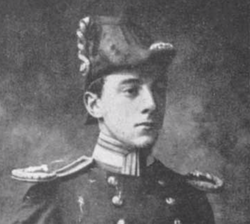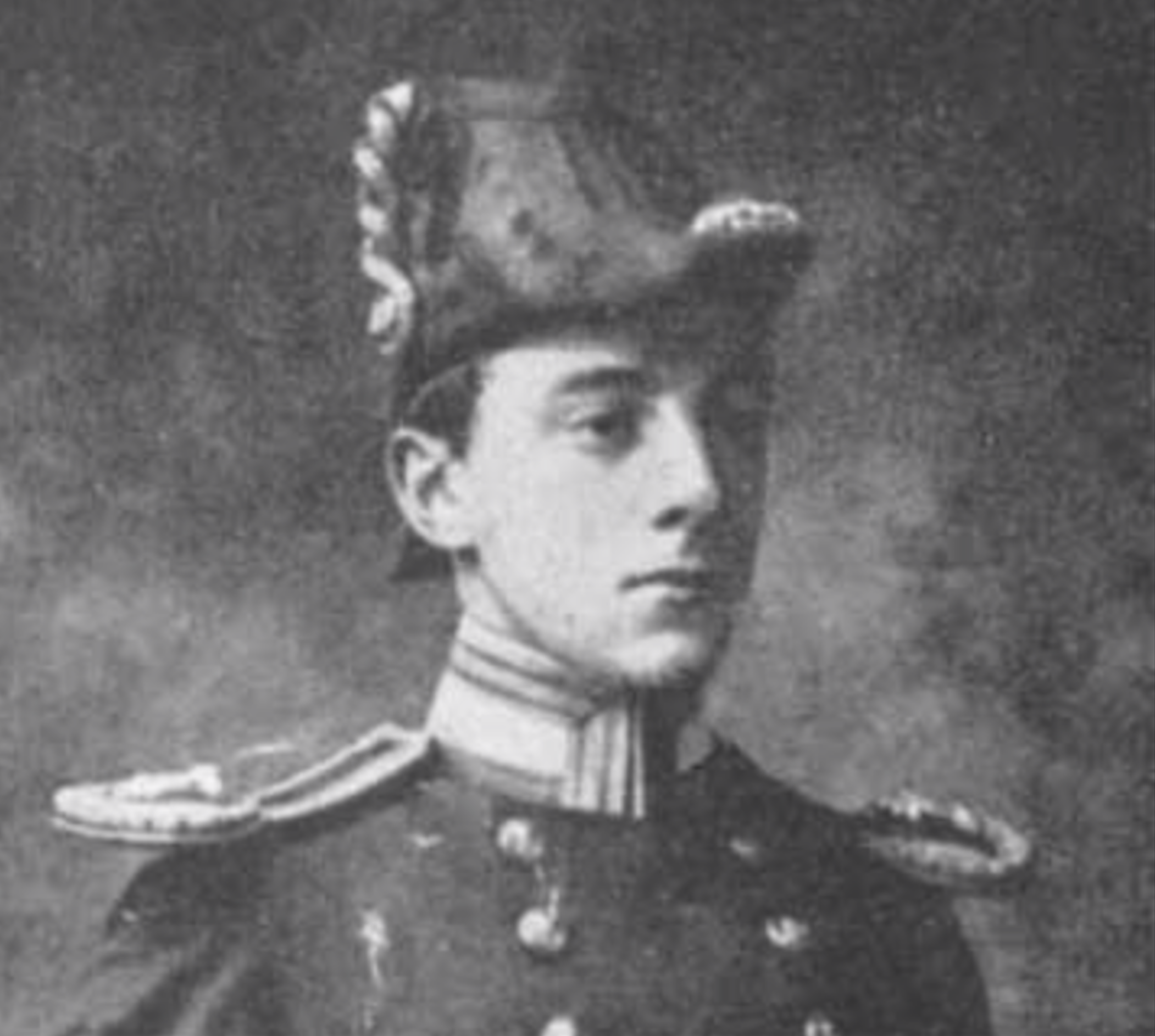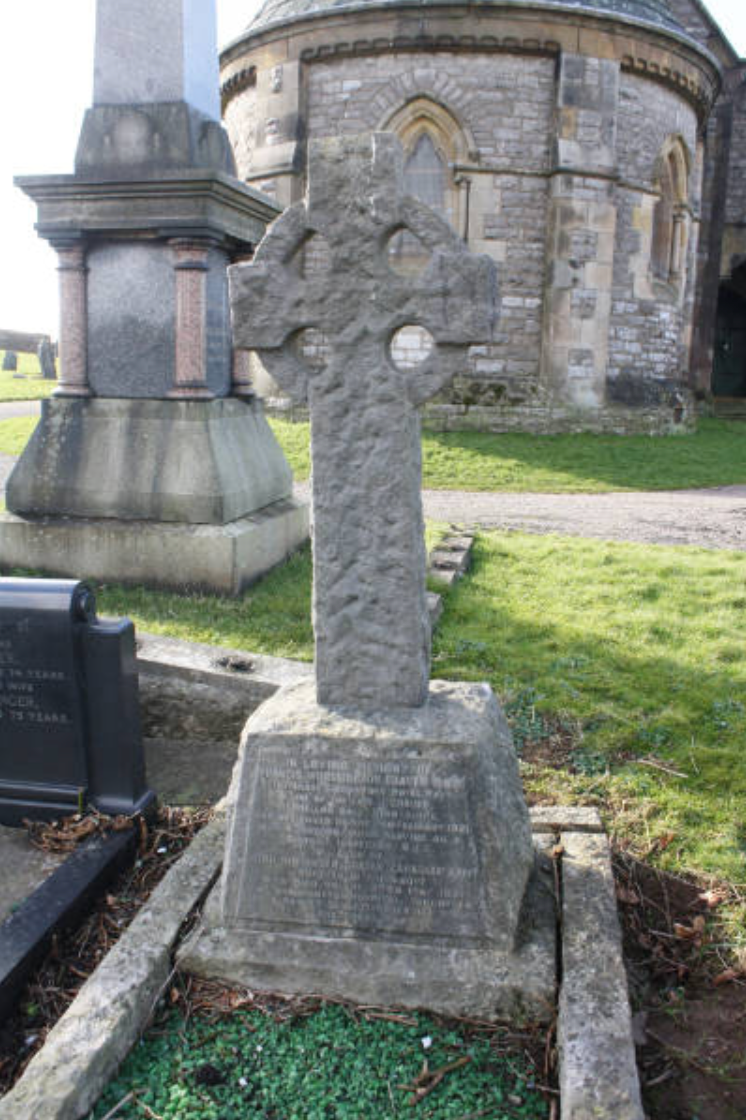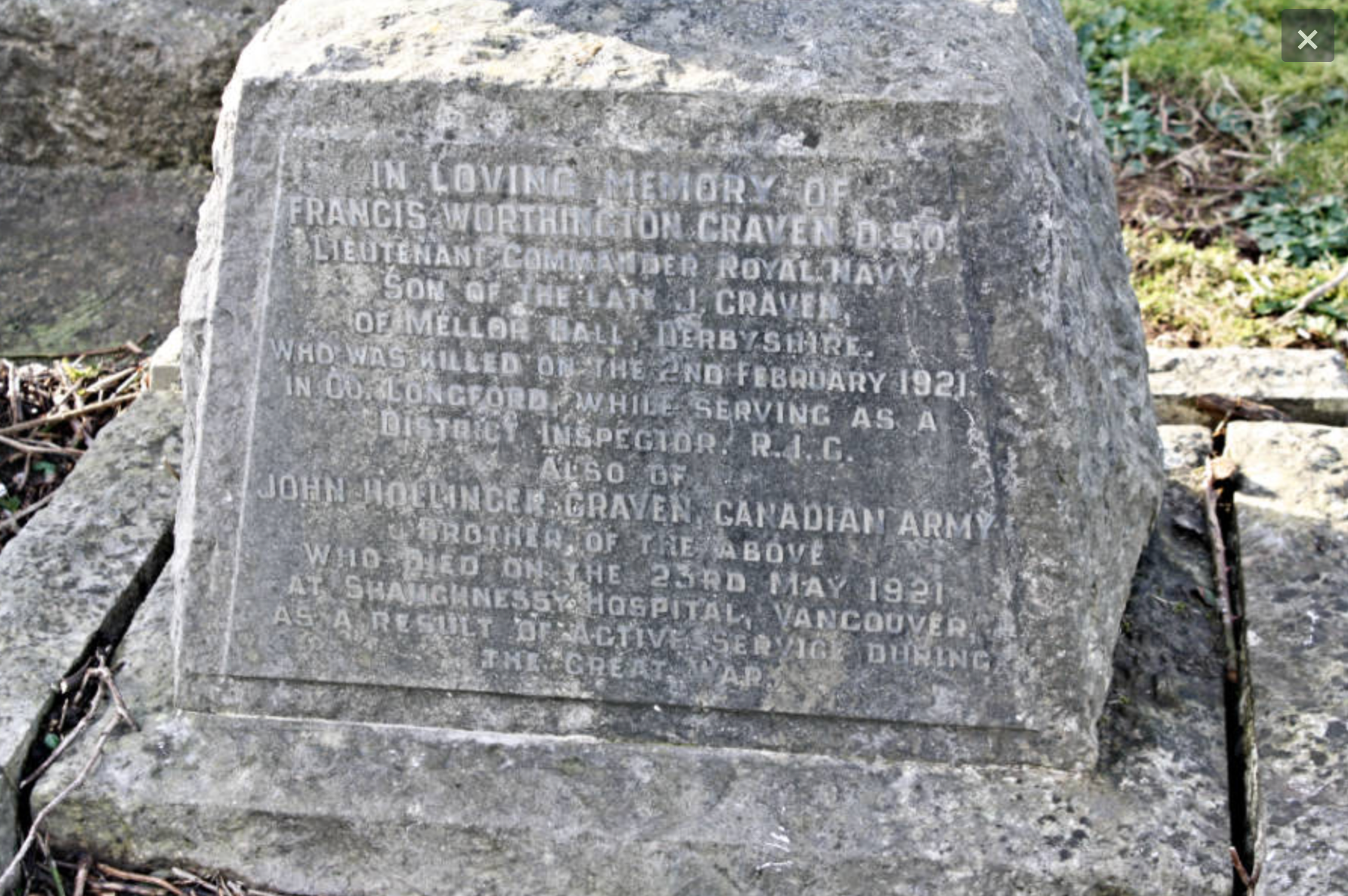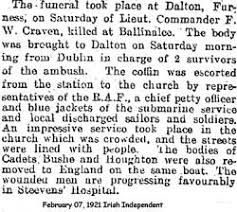DSO gazetted to Lieut. Francis Worthington Craven, R.N. In recognition of his services when H.M.S. " Otranto " was wrecked on the 6th October, 1918. H.M.S. " Otranto" Was damaged in collision with the s.s. " Kashmir " whilst carrying a large number of American troops. Lieutenant Craven displayed magnificent courage and seamanship in placing H.M.S. " Mounsey " alongside H.M.S.." Otranto " in spite of the fact that the conditions of wind, weather and sea were exceptionally severe. After going alongside and embarking a certain number of men, it was reported that the " Mounsey" had sustained considerable damage, and that there was a large quantity of water in the engine room. Lieutenant Craven, therefore, left the " Otranto," but on finding the damage was not so serious as had been reported, he again went alongside, though he had previously experienced great difficulty in getting away. His action resulted in the saving of over 600 lives which would otherwise have certainly been lost. His performance was a remarkable one, and in personal courage, coolness and seamanship ranks in the very highest order.
The Otranto made for the Irish coast off Belfast, while the Kashmir put on all steam and continued toward Glasgow. The Captain of the Otranto attempted to beach her, but instead hit one of the rocky precipices that skirt the shores of northern Ireland, and the ship was pounding herself to pieces when the two English destroyers came to her aid. Lieutenant Francis Worthington Craven, commanding the destroyer Mounsey, made a frantic attempt at rescue, but the other destroyer's captain, evidently believing discretion the better part of valor, refrained from standing by. Otranto's captain, knowing his ship was doomed, besought Lieutenant Craven not to come over, declaring it meant certain suicide for himself and his crew "Well, it must be suicide then," was his reply, " for we ae coming over" Then followed most awful and heartrending scenes. Pinched between sinking Otranto and rocky shores Lieutenant Craven's ship was torn and wrenched while men flung themselves from the deck of the Otranto to that of the destroyer. Miscalculating, in their frenzy, many fell into the sea, others were crushed to death between tossing ships, while others in jumping to the Otranto's deck sustained broken legs, arms or ribs or were otherwise injured. Three trips were made by the heroic Craven, landing alternately his injured, dying or dead cargo at Isley near Glasgow or at a point opposite Belfast, Ireland. Each time Otranto's captain protested it was down-right madness, only to receive from Lieutenant Craven, who himself was badly hurt, the same cool, firm and unvarying reply that so long as his own boat could be kept afloat or the Otranto remained above water, he would keep coming. Just as he was leaving the Belfast pier for a fourth trip. Lieutenant Craven saw the Otranto make one frightful plunge and sink into the sea. And the mighty breakers rolled on in all their anger over the spot where the ill-starred Otranto had madly tossed and struggled a few moments before. It was providential that Lieutenant Craven had proceeded no further in his fourth errand of mercy, as in making for Belfast with all possible speed he was barely able to reach there. Experts declared that had he continued on into open ocean waters, his vessel could never have lived, so badly was she damaged. While Lieutenant Craven's ship went into dry dock for repair at Belfast, he entered a hospital where his injuries received attention and where, six weeks later, we found him, with many others whom he had rescued, and learned from his own lips this story.
1918 Jul 9. The President of the United States of America, authorized by Act of Congress, July 9, 1918, takes pleasure in presenting the Army Distinguished Service Medal to Lieutenant Francis W. Craven, British Royal Navy, for exceptionally meritorious and distinguished service in a position of great responsibility to the Government of the United States, during World War I. While Commanding His Majesty's destroyer MOUNSEY, Lieutenant Craven rescued 7 officers and 313 men of the American forces at sea on 16 October 1918.
1919 Feb 18 . Hansard records that Viscount Curzon tabled a question in the House of Lords, asking the First Lord of the Admiralty to "indicate what steps have been taken to recognise the bravery and seamanship of the officer in command of His Majesty's ship "Mounsey"on the occasion of the sinking of His Majesty's transport "Otranto" in a full gale off the Irish coast, which resulted in the saving of 600 lives, and also the services of the officers and men of His Majesty's ship "Mounsey" on the same occasion?". The response was that "My Noble Friend will be glad to know that the King has been pleased to approve of the appointment of Lieutenant Francis W. Craven to be a Companion of the Distinguished Service Order, and that he has received a letter expressing the high appreciation of the Admiralty. He has also been directed to submit the names of any officers and men considered deserving of awards."
After the war, Craven suffered financial difficulties. Facing bankruptcy, he resigned from the Royal Navy in 1920. He joined the Auxiliary Division of the Royal Irish Constabulary as a District Inspector, but just six weeks later he was killed in an Irish Republican Army ambush.
~~~~~~~~~~~~~~~~
According to his Royal Naval Service record Francis W Craven was born on the 29th Feb 1889 in Manchester. His address at the time of joining was given as Carlton Lodge, Dudley Rd, Whalley Range, Manchester; where he lived with his mother. He joined his first ship in May 1903 and served throughout the war with a very good record. Between 1914 and 1917 he served on the super-dreadnought HMS Queen Elizabeth, flagship for the naval operations in the Dardanelles campaign.
By 1918 he was commanding HMS Mounsey, an M-Class Destroyer. In October 1918 HMS Mounsey was off the Western Isles when she was called to the aid of HMS Otranto, an armed merchant cruiser used as a troopship and ferrying American soldiers to the Front. Otranto had collied in rough seas with an escort ship, struck rocks, and was sinking fast. 351 American troops were lost, together with 80 British crew; however Craven, in command of HMS Mounsey, managed to rescue almost 350 Americans and landed them at Belfast.
For his seamanship and gallantry during the rescue operations Craven was awarded the Distinguished Service Order, the American Distinguished Service Medal and the American Navy Cross (second only in importance to the Medal of Honour).
DSO gazetted to Lieut. Francis Worthington Craven, R.N. In recognition of his services when H.M.S. " Otranto " was wrecked on the 6th October, 1918. H.M.S. " Otranto" Was damaged in collision with the s.s. " Kashmir " whilst carrying a large number of American troops. Lieutenant Craven displayed magnificent courage and seamanship in placing H.M.S. " Mounsey " alongside H.M.S.." Otranto " in spite of the fact that the conditions of wind, weather and sea were exceptionally severe. After going alongside and embarking a certain number of men, it was reported that the " Mounsey" had sustained considerable damage, and that there was a large quantity of water in the engine room. Lieutenant Craven, therefore, left the " Otranto," but on finding the damage was not so serious as had been reported, he again went alongside, though he had previously experienced great difficulty in getting away. His action resulted in the saving of over 600 lives which would otherwise have certainly been lost. His performance was a remarkable one, and in personal courage, coolness and seamanship ranks in the very highest order.
The Otranto made for the Irish coast off Belfast, while the Kashmir put on all steam and continued toward Glasgow. The Captain of the Otranto attempted to beach her, but instead hit one of the rocky precipices that skirt the shores of northern Ireland, and the ship was pounding herself to pieces when the two English destroyers came to her aid. Lieutenant Francis Worthington Craven, commanding the destroyer Mounsey, made a frantic attempt at rescue, but the other destroyer's captain, evidently believing discretion the better part of valor, refrained from standing by. Otranto's captain, knowing his ship was doomed, besought Lieutenant Craven not to come over, declaring it meant certain suicide for himself and his crew "Well, it must be suicide then," was his reply, " for we ae coming over" Then followed most awful and heartrending scenes. Pinched between sinking Otranto and rocky shores Lieutenant Craven's ship was torn and wrenched while men flung themselves from the deck of the Otranto to that of the destroyer. Miscalculating, in their frenzy, many fell into the sea, others were crushed to death between tossing ships, while others in jumping to the Otranto's deck sustained broken legs, arms or ribs or were otherwise injured. Three trips were made by the heroic Craven, landing alternately his injured, dying or dead cargo at Isley near Glasgow or at a point opposite Belfast, Ireland. Each time Otranto's captain protested it was down-right madness, only to receive from Lieutenant Craven, who himself was badly hurt, the same cool, firm and unvarying reply that so long as his own boat could be kept afloat or the Otranto remained above water, he would keep coming. Just as he was leaving the Belfast pier for a fourth trip. Lieutenant Craven saw the Otranto make one frightful plunge and sink into the sea. And the mighty breakers rolled on in all their anger over the spot where the ill-starred Otranto had madly tossed and struggled a few moments before. It was providential that Lieutenant Craven had proceeded no further in his fourth errand of mercy, as in making for Belfast with all possible speed he was barely able to reach there. Experts declared that had he continued on into open ocean waters, his vessel could never have lived, so badly was she damaged. While Lieutenant Craven's ship went into dry dock for repair at Belfast, he entered a hospital where his injuries received attention and where, six weeks later, we found him, with many others whom he had rescued, and learned from his own lips this story.
1918 Jul 9. The President of the United States of America, authorized by Act of Congress, July 9, 1918, takes pleasure in presenting the Army Distinguished Service Medal to Lieutenant Francis W. Craven, British Royal Navy, for exceptionally meritorious and distinguished service in a position of great responsibility to the Government of the United States, during World War I. While Commanding His Majesty's destroyer MOUNSEY, Lieutenant Craven rescued 7 officers and 313 men of the American forces at sea on 16 October 1918.
1919 Feb 18 . Hansard records that Viscount Curzon tabled a question in the House of Lords, asking the First Lord of the Admiralty to "indicate what steps have been taken to recognise the bravery and seamanship of the officer in command of His Majesty's ship "Mounsey"on the occasion of the sinking of His Majesty's transport "Otranto" in a full gale off the Irish coast, which resulted in the saving of 600 lives, and also the services of the officers and men of His Majesty's ship "Mounsey" on the same occasion?". The response was that "My Noble Friend will be glad to know that the King has been pleased to approve of the appointment of Lieutenant Francis W. Craven to be a Companion of the Distinguished Service Order, and that he has received a letter expressing the high appreciation of the Admiralty. He has also been directed to submit the names of any officers and men considered deserving of awards."
After the war, Craven suffered financial difficulties. Facing bankruptcy, he resigned from the Royal Navy in 1920. He joined the Auxiliary Division of the Royal Irish Constabulary as a District Inspector, but just six weeks later he was killed in an Irish Republican Army ambush.
~~~~~~~~~~~~~~~~
According to his Royal Naval Service record Francis W Craven was born on the 29th Feb 1889 in Manchester. His address at the time of joining was given as Carlton Lodge, Dudley Rd, Whalley Range, Manchester; where he lived with his mother. He joined his first ship in May 1903 and served throughout the war with a very good record. Between 1914 and 1917 he served on the super-dreadnought HMS Queen Elizabeth, flagship for the naval operations in the Dardanelles campaign.
By 1918 he was commanding HMS Mounsey, an M-Class Destroyer. In October 1918 HMS Mounsey was off the Western Isles when she was called to the aid of HMS Otranto, an armed merchant cruiser used as a troopship and ferrying American soldiers to the Front. Otranto had collied in rough seas with an escort ship, struck rocks, and was sinking fast. 351 American troops were lost, together with 80 British crew; however Craven, in command of HMS Mounsey, managed to rescue almost 350 Americans and landed them at Belfast.
For his seamanship and gallantry during the rescue operations Craven was awarded the Distinguished Service Order, the American Distinguished Service Medal and the American Navy Cross (second only in importance to the Medal of Honour).
Family Members
Sponsored by Ancestry
Advertisement
Records on Ancestry
Advertisement
